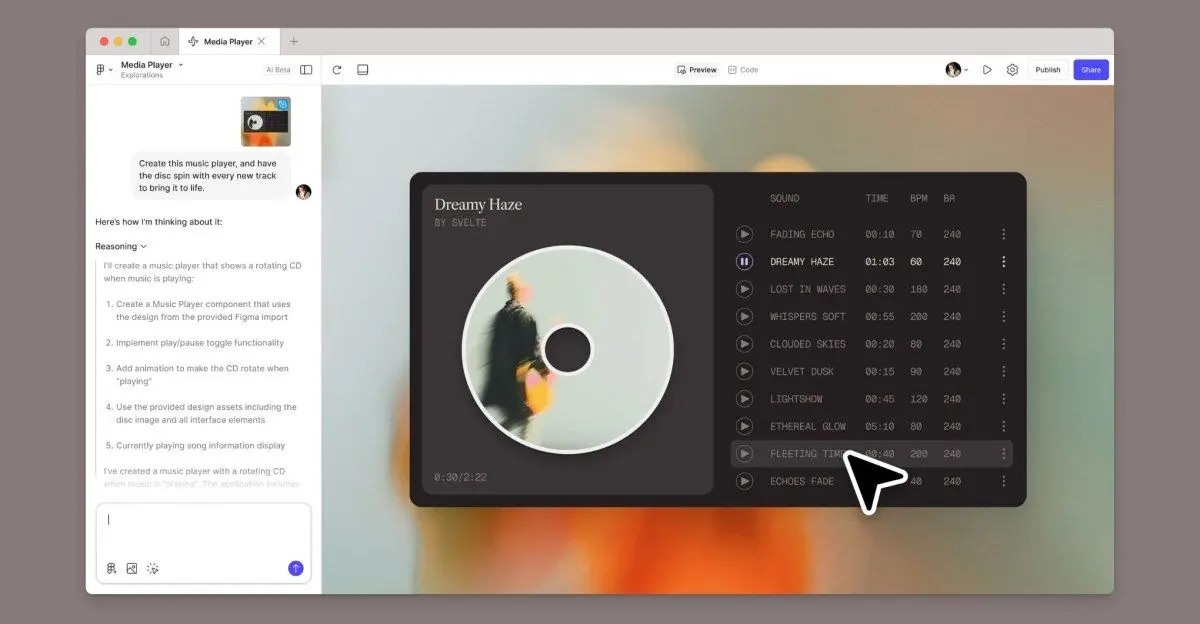Figma Democratizes App Development with AI-Powered Tool Now Available to All Users
3 Sources
3 Sources
[1]
Figma's AI app building tool is now available for everyone
Jess Weatherbed is a news writer focused on creative industries, computing, and internet culture. Jess started her career at TechRadar, covering news and hardware reviews. Figma Make, the prompt-to-app coding tool that Figma introduced earlier this year, is now available for all users. Similar to AI coding tools like Google's Gemini Code Assist and Microsoft's GitHub Copilot, Figma Make allows users to build working prototypes and apps using natural language descriptions, instead of needing to have innate coding skills. While Figma initially launched it in beta for "Full Seat" users -- the subscription tier required to unlock all of Figma's design products -- Figma Make can now be accessed by all Figma users, with limitations in place depending on the user's subscription plan. The ability to publish designs created by Figma Make, which is currently still in beta, will be restricted to users with Full Seat access. Users on View, Collab, Dev, and free Starter Seat plans will be limited to experimenting with Figma Make in their personal drafts. That means that all users can at least try a demo of Figma Make, but actually doing anything with those creations will require moving to the most expensive subscription tier. One advantage that Figma Make notably has over similar app builder coding tools is the ability to include design references. Users can upload an image or Figma design into the tool alongside the description of what they want it to create -- an animated music player, for example -- to guide how the final results should look. Individual elements like text formatting and font style can then also be adjusted using additional AI prompts or edited manually. Figma Make is leaving beta alongside other Figma features like the Make and Edit image tool that uses generative AI to create or manipulate images based on text descriptions, and the resolution boosting feature that can be used to improve low-quality images. Figma is also introducing a new AI credit system that gives users a set number of credits that can be exchanged for using the platform's AI tools, with allocations based on paid membership tiers. Figma says that View, Collab, and Dev Seat users can use AI features with lower credit limits, "that are subject to change," while Full Seat users will have unlimited access...for now. "AI credits are intended to easily cover day-to-day needs for Full seats, but for power users who may need more, team admins will be able to buy additional credits later this year," Figma said in its announcement. "Until then, we won't be strictly enforcing credit limits for Full seats."
[2]
Figma's AI app builder is now available to all users
Figma Make, the prompt-to-app coding tool, is now available to all Figma users after exiting its beta phase, previously limited to "Full Seat" subscribers. This tool enables users to create working prototypes and applications using natural language descriptions. Similar to AI coding tools such as Google's Gemini Code Assist and Microsoft's GitHub Copilot, Figma Make operates without requiring innate coding skills. While all Figma users can access the tool, its functionalities are constrained by subscription plans. Publishing designs produced by Figma Make, currently in beta, remains exclusive to Full Seat users. Users on View, Collab, Dev, and free Starter Seat plans are restricted to experimenting with Figma Make within their personal drafts. Full access subscriptions are required to utilize creations beyond a demo phase. Figma Make offers the distinct advantage of incorporating design references. Users can upload images or Figma designs, alongside textual descriptions, to guide the AI in generating desired outputs, such as an animated music player. Users can further refine individual elements like text formatting and font style using additional AI prompts or manual adjustments. The release of Figma Make from beta coincides with the full release of other Figma features, including the Make and Edit image tool, which utilizes generative AI for image creation and manipulation based on text descriptions, and a resolution boosting feature for enhancing low-quality images. Figma is also implementing a new AI credit system. Users receive a specific number of credits for using the platform's AI tools, with allocations determined by paid membership tiers. View, Collab, and Dev Seat users have lower, variable credit limits for AI features. Full Seat users currently have unlimited access. Figma stated in its announcement, "AI credits are intended to easily cover day-to-day needs for Full seats, but for power users who may need more, team admins will be able to buy additional credits later this year. Until then, we won't be strictly enforcing credit limits for Full seats."
[3]
Click. Type. Launch. Figma's AI App Builder Goes Public
In a bold step, Figma is once again making waves -- this time by opening up its feature-rich AI-powered app building tool to the public. Earlier offered in beta, this technology is a game-changer in the way digital products are developed by developers, designers, and even non-tech teams. Here's the lowdown on what this launch entails and how it's more than an AI trick, but a product development pipeline game-changer. Figma, the design world's powerhouse, just lowered the velvet rope. Its AI-fuelled app-building tool, once locked behind beta tests and waitlists, is now open to all. The gesture doesn't merely democratize app creation -- it reimagines what it means to go from concept to code. Figma's new AI product turns wireframes and prompts into shipping code or working prototypes. It's not just a pretty toy -- it's a strategic shift that uses AI to eliminate the walls between design and development. Developers can explain an app in English, and the AI creates an interactive mock-up that can be polished, tested, and shipped more quickly than traditional processes ever could. Designers can prototype. Developers can avoid boilerplate. Product managers can test ideas. And non-coders? They can build, too. The AI infrastructure of the tool combines natural language processing with Figma's native design platform and a deep component library. It does not simply vomit out UI -- it knows context, logic, and user flow. It can create screens, buttons, modals, and connect them all together sensibly. Imagine ChatGPT + Canva + your dev team's front-end repo. It's not merely about creating any app -- it's about creating usable, scalable interfaces that are in tune with user intent. It's designed to iterate, to collaborate, and to move quickly. Design and dev handoffs in a product cycle are usually points of friction. Figma's shift levels that curve. It matches vision and delivery from day one, which is a competitive differentiation for companies in fast-moving markets. Teams don't only build faster -- they build better, on a shared AI-first canvas. This launch is also a warning: AI is no longer simply an enhancement of the backend. It's emerging as a co-creator, discipline by discipline. While companies rush to add generative AI to their backends, Figma is already providing a functional solution for digital creators. Figma's AI app builder is not just a tool -- it's a catalyst. It empowers anyone with an idea to prototype like a pro, develop like a dev, and launch like a startup. And now that it's available to everyone, we're looking at a new frontier where design, engineering, and AI converge seamlessly.
Share
Share
Copy Link
Figma's AI-powered app building tool, Figma Make, is now accessible to all users, revolutionizing the app development process by allowing creation through natural language prompts.
Figma Make: AI-Powered App Development for All
Figma, the renowned design platform, has made a significant move in the tech industry by releasing its AI-powered app building tool, Figma Make, to all users
1
. This tool, which was previously in beta and limited to "Full Seat" subscribers, is now accessible across various subscription tiers, albeit with certain limitations2
.Revolutionary App Creation Process

Source: The Verge
Figma Make allows users to create working prototypes and applications using natural language descriptions, eliminating the need for extensive coding skills. This approach is similar to other AI coding tools like Google's Gemini Code Assist and Microsoft's GitHub Copilot
1
. The tool's standout feature is its ability to incorporate design references, enabling users to upload images or existing Figma designs alongside textual descriptions to guide the AI in generating desired outputs2
.Accessibility and Limitations
While Figma Make is now available to all Figma users, the extent of its functionality varies based on subscription plans:
- Full Seat users: Can publish designs created with Figma Make (beta feature) and have unlimited access to AI credits
1
. - View, Collab, Dev, and free Starter Seat plans: Limited to experimenting with Figma Make in personal drafts
2
.
Additional AI-Powered Features
Coinciding with Figma Make's public release, Figma has also launched other AI-enhanced features:
- Make and Edit image tool: Uses generative AI for image creation and manipulation based on text descriptions
1
. - Resolution boosting feature: Improves low-quality images
1
.
New AI Credit System
Figma has introduced an AI credit system that allocates a set number of credits for using the platform's AI tools, based on paid membership tiers:
- View, Collab, and Dev Seat users: Lower credit limits, subject to change
1
. - Full Seat users: Currently have unlimited access, with the possibility of purchasing additional credits in the future
2
.
Related Stories
Impact on Product Development

Source: ET
Figma Make is poised to revolutionize the product development pipeline by bridging the gap between design and development. It enables various team members, including designers, developers, product managers, and even non-coders, to rapidly prototype and test ideas
3
.The tool combines natural language processing with Figma's native design platform and a comprehensive component library, allowing for the creation of usable, scalable interfaces that align with user intent
3
. This integration of AI into the creative process marks a significant shift in how digital products are conceptualized and developed.Industry Implications
Figma's move to make its AI app builder publicly available signals a broader trend in the tech industry. It demonstrates how AI is evolving from a backend enhancement to a co-creator in various disciplines. This development could potentially reshape the competitive landscape, especially for companies operating in fast-moving markets
3
.As Figma continues to push the boundaries of design and development tools, the industry watches closely to see how this democratization of app creation will impact the future of digital product development.
References
Summarized by
Navi
[2]
Related Stories
Recent Highlights
1
OpenAI secures $110 billion funding round from Amazon, Nvidia, and SoftBank at $730B valuation
Business and Economy

2
Samsung unveils Galaxy S26 lineup with Privacy Display tech and expanded AI capabilities
Technology

3
Anthropic faces Pentagon ultimatum over AI use in mass surveillance and autonomous weapons
Policy and Regulation








